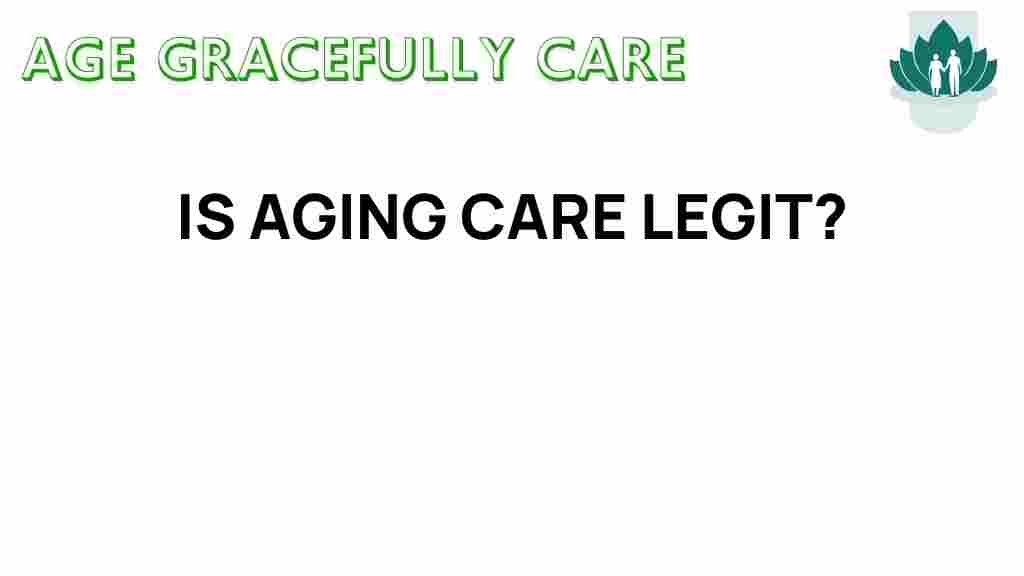Aging Care: A Genuine Solution for Our Aging Population?
As our society continues to evolve, the reality of an aging population has become increasingly prominent. The need for effective aging care solutions has never been more crucial. With advancements in healthcare trends and a growing focus on wellness, many families are exploring various options for elder support. This article aims to unveil the truth behind aging care and whether it stands as a genuine answer to the challenges faced by seniors today.
Understanding Aging Care
Aging care encompasses a range of services and support systems designed to assist older adults in maintaining their quality of life. It includes in-home care, assisted living facilities, and community care programs. As the senior living landscape shifts, it is essential to explore what aging care truly means and how it addresses the needs of the elderly.
The Importance of Elder Support
As individuals age, they may confront various health challenges and lifestyle changes. The importance of elder support cannot be overstated. This support can manifest in several ways:
- Physical Assistance: Helping seniors with daily activities such as bathing, dressing, and mobility.
- Emotional Support: Providing companionship and mental health resources to combat loneliness and depression.
- Healthcare Management: Assisting with medication management, medical appointments, and following treatment plans.
Current Healthcare Trends Influencing Aging Care
The landscape of aging care is shaped by several healthcare trends that aim to improve the quality of life for seniors:
- Technological Advancements: Smart home devices and telehealth services are becoming commonplace, allowing for better monitoring and support.
- Holistic Approaches: There is a growing emphasis on wellness, focusing on physical, mental, and emotional health.
- Community-Based Programs: Many regions are developing community care initiatives that provide resources and support tailored to local seniors.
Exploring Senior Living Options
When considering aging care, families often explore various senior living options. Here are some common choices:
- Independent Living: Ideal for seniors who can live independently but may benefit from social activities and meal services.
- Assisted Living: Offers support with daily activities while allowing for a degree of independence.
- Nursing Homes: Provide round-the-clock medical care for seniors with significant health challenges.
Caregiving: A Family Commitment
Caregiving often falls on family members, which can be both a rewarding and challenging responsibility. Here are some steps to consider when taking on the role of a caregiver:
- Assess Needs: Evaluate the specific needs of your loved one, including physical, emotional, and medical support.
- Educate Yourself: Learn about the conditions affecting your loved one and available healthcare resources.
- Establish a Routine: Create a daily schedule that includes time for activities, meals, and rest.
- Seek Support: Don’t hesitate to reach out to community resources or support groups for assistance.
Common Challenges in Aging Care
While aging care presents numerous benefits, it also comes with challenges. Here are some common issues faced by caregivers and seniors:
- Financial Strain: The cost of care can be significant, leading to financial stress for families.
- Emotional Toll: Caregiving can lead to burnout or feelings of isolation.
- Difficult Conversations: Discussing care options with aging parents can be sensitive and challenging.
Troubleshooting Tips for Caregivers
If you are facing difficulties in your caregiving journey, consider the following troubleshooting tips:
- Communicate Openly: Maintain open lines of communication with your loved one about their needs and feelings.
- Utilize Technology: Use apps and devices that can help manage medications and appointments.
- Join Support Groups: Engaging with other caregivers can provide valuable insights and emotional support.
The Future of Aging Care
As the aging population continues to grow, the future of aging care is evolving. Here are some anticipated trends:
- Increased Personalization: Care plans will become more tailored to individual needs, preferences, and lifestyles.
- Integration of Services: A more coordinated approach to healthcare, combining medical, social, and community resources.
- Focus on Preventative Care: Emphasizing wellness and preventative measures to enhance quality of life.
Community Care: A Key Component
Community care plays a vital role in the overall landscape of aging care. It involves collaborative efforts to provide support and services within local communities. Here’s how community care can benefit seniors:
- Accessibility: Local services are often easier for seniors to access, reducing the need for transportation.
- Social Engagement: Community programs foster social connections, helping combat loneliness.
- Resource Sharing: Communities can pool resources to offer more comprehensive support services.
Conclusion: Is Aging Care the Solution We Need?
In conclusion, aging care can indeed be a genuine solution for the challenges faced by our aging population. With the right support systems, resources, and approaches in place, we can enhance the quality of life for seniors. Families and communities must work together to embrace innovative healthcare trends and prioritize wellness, ensuring that our elderly loved ones receive the care they deserve.
For more information on aging care and available resources, visit this helpful website. If you’re looking to connect with others in your caregiving journey, consider joining a local support group or exploring community care options.
As we navigate the complexities of aging, let’s remember that caring for our elders is not just a responsibility; it’s an opportunity to honor their contributions and enhance their lives in meaningful ways.
This article is in the category Care and created by AgeGracefullyCare Team
